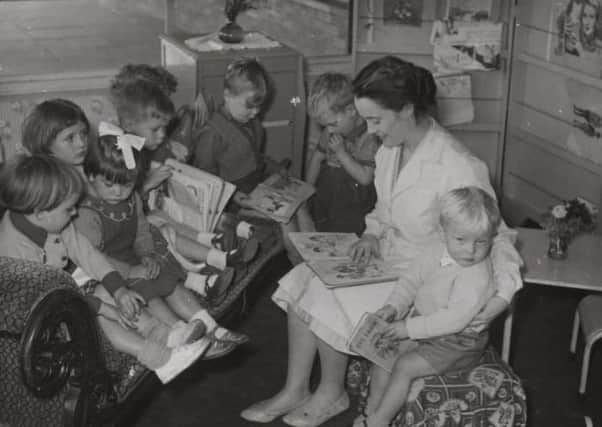The Nostalgia column with Margaret Watson: Streets were like one extended family


The school had been built in 1950 to help women who wanted to go out to work after the war ended and when life was getting better for everyone.
But I remember that most women in our town always went out to work before nurseries were built and it was grandparents and aunts who looked after us.
Advertisement
Hide AdAdvertisement
Hide AdIn my childhood I lived in two villages – Springfield and the Flatts – and I remember everyone in the street seemed to share in the up-bringing of children.


To me, the streets were like one big extended family with grandparents, aunts, uncles and cousins living almost next door to each other.
The word “babysitter” hadn’t been invented and if our parents had to go anywhere there was always an older brother or sister to take care of us.
If families didn’t have any relatives living in the street, there was always a reliable neighbour they could adopt.
Advertisement
Hide AdAdvertisement
Hide AdUsually these were spinster ladies who would become surrogate aunts to children whose mothers went out to work.
They were an important part of street life and it was normal for them to look upon children in their care as their own, and they were always addressed as auntie.
There were no worries about child care in streets like ours because every street seemed to have its own auntie.
The two I remember most were Auntie Mary who lived in Victoria Road, Springfield, and Auntie Florrie, who lived in Halliley Street on the Flatts, where the nursery pictured above was built.
Advertisement
Hide AdAdvertisement
Hide AdAuntie Mary was really Mary Donovan, a lovely old lady with white hair who lived in a little house at the bottom of our street which had a giant aspidistra in a big dark green bowl standing in the doorway.
She had a photograph on the sideboard of a brother in military uniform who had been killed in the First World War and whose death was her greatest sorrow.
During school holidays, Auntie Mary looked after the Cosgrove family, Peter, Margaret and Catherine, while their parents were at work, and also at teatime when they came home from school.
She loved the Cosgrove children as though they were her own, and they loved and respected her.
Advertisement
Hide AdAdvertisement
Hide AdWhen my family moved to Woodbine Street, on the Flatts, I wasn’t surprised to find my new-found friends, Audrey and Judith Glover, had a similar aunt called Florrie.
She wasn’t related but was an important part of their family and took care of the Glover girls while their parents were at work and also during summer holidays.
Auntie Florrie worried and fretted about the Glover girls as though they were her own, and this continued after they were married and had children of their own.
The house she lived in overlooked a spare piece of land, which coincidentally was the spot on which the new Flatts Nursery was built, making the job of the “Auntie Florrie’s” of this world completely redundant.
Advertisement
Hide AdAdvertisement
Hide AdMy family, however, was so big and there were so many of us living almost on top of each other, we didn’t need surrogate aunts because we had enough of our own.
I remember as a child being dispatched sometimes to the home of Auntie Lillian and Uncle Albert who lived in Dale Street, Batley Carr, next to the rhubarb fields in which I often played.
It was a house I loved to visit because they had three daughters, all bigger and older than me, Edith, Gladys and Anne, who I looked upon as sisters and still do, even though sadly Edith is no longer with us.
In those days, relatives and neighbours played a much bigger part in the lives of children than they do today, and that’s why I cherish memories of those who helped look after me as a child.
Advertisement
Hide AdAdvertisement
Hide AdMy Uncle Albert was used to looking after girls because he never had a son, and he told us fascinating tales about the wars in which he had served.
As a young man he had fought in the Boer War and later World War One, and even though he was a stickler for discipline, I was never afraid of him.
He was an ex-boxing champion who taught me how to box – but not always according to the Marquis of Queensbury rules.
I was only three years old but he still thought girls should be able to look after themselves and taught me how to duck and dive and deliver a powerful punch.
He called me “bash ‘ems”.
Advertisement
Hide AdAdvertisement
Hide AdBut no matter how many aunts and uncles, sisters and brothers, we had in those days, it was generally grandmothers who everyone turned to for help.
They were the women you went to in emergencies and who acted as local midwives when babies were born and also unofficial “layer-out” when anyone died.
If you have memories of childhood, please let me know, and between us we might be able to make these dreary days of lockdown a little brighter.
Email [email protected] with your recollections.